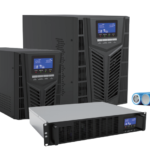
Custom UPS & UPS systems
At our state-of-the-art manufacturing facility, we offer an extensive range of Uninterruptible Power Supply (UPS) systems designed to meet diverse client needs across various industries. Our product lineup includes:
Single-Phase UPS Systems: 1kva-10kva Available in both tower and rack-mounted configurations.
Three-Phase UPS Solutions: Designed for large-scale industrial and commercial environments, such as high frequency UPS,low frequency UPS,moular UPS. From 10kva to 600kva .
Lithium Battery UPS Models: Incorporating the latest lithium technology, these systems offer high efficiency, longer lifespan, and quick charging, ideal for modern applications requiring cutting-edge solutions.
Table Of Contents For This Page
It is not easy to introduce all aspects of UPS systems with lithium batteries, so we have prepared a lot of information on this page for you to delve into. To make sure you can find the information you want quickly, we have prepared this content directory that will jump to the corresponding location when you click on it.
General Applications For UPS system
The application scope of UPS systems spans data centers, medical facilities, industrial automation, computing, and offices. Lithium UPS system advantages include long lifespan, light weight design, and low maintenance costs.And Lead-acid UPS systems are cheaper.
General Hot Selling UPS
Long Lifespan and TCO Savings:Reduced maintenance costs, lithium batteries being 40% lighter than lead-acid batteries, occupying less space, and extending battery life up to 8-10 years.
Compact Design: Lightweight design, suitable for space-constrained scenarios such as data centers and home offices.
User-Friendly Features: Highlight the LCD display, remote management options, and easy installation to enhance user experience.
Competitive Comparison: Price competitiveness.
Customer Cases: Applications in data centers and medical facilities.

Compact UPS
- Capacity: 1KVA to 10kva
- Voltage: 120V/230V
- Weight (kg): 5 -- 10
- Dimensions 10" x 6" x 8"
– Description: Ideal for small offices, home networks, or small server rooms.
– Key Features: Compact design, lithium battery lifespan up to 10 years, fast recharge in 2-3 hours.

Mid-Range UPS
- Capacity : 10KVA--200KVA
- Voltage: 120V/230V/400va/380va
- Weight(kg) : 7--300
- Dimensions 18" x 12" x 16" etc
-Description: Perfect for medium-sized businesses, IT closets, or small data centers.
– Key Features: Scalable runtime, advanced battery management system, remote monitoring.

High-Capacity UPS three phase
- Capacity: 200KVA-600KVA
- Voltage : 120V/230V/380VA/400VA
- Weight (kg) : 50-600
- Dimensions 24" x 18" x 20" etc
– Description: Designed for large enterprises, data centers, or industrial applications.
– Key Features: High power density, redundant systems, integrated cooling.

Wanna dig deeper in UPS power supply?
Estimated wholesale Cost Analysis For UPS
All the money paid to Daopulse for the purchase of the products is secure. Below is an outline of the costs .

The cost of lithium UPS varies significantly depending on capacity, and additional features.
$
Shipping cost is the amount of money that you will pay for the transportation of your products from China to your doorstep. Daopulse offers you the convenience of any kind. Any other fees relating to taxes, service fees, etc . They are usually low-cost amounts.
$
You can decide to either pay the full amount of the order or pay 30% as deposit and balance before shipment.
$Production & Lead Time
As a manufacturer of UPS systems, we begin with system design to ensure that we meet the customer’s needs. We then make sure high-quality lithium-ion batteries and other components . In our modern facility, the components are meticulously assembled and thoroughly tested to guarantee performance and safety. Each system undergoes a rigorous quality inspection before it is packaged.
Step 1: Order Placement and Confirmation (1-3 days)
Customers can place orders through our website, email, or by directly contacting our sales team. Orders typically require specifying the model, quantity, and any customization requirements. Our sales team reviews the orders, provides detailed quotations, and estimates the delivery date. Customers will receive a confirmation and can stay updated on the progress of their orders at any time.

Step 2: Order Production (20-25 days)
The production process begins with the design and engineering phase. Our team of engineers designs the UPS system based on the specific needs of the customer or standard specifications, utilizing advanced simulation tools to optimize performance and efficiency. For instance, during the design phase, suitable lithium-ion batteries are selected to ensure that their energy density and cycle life meet the requirements.
Next is the component prepare stage. We ensure the acquisition of high-quality lithium batteries, which typically offer longer lifespans and higher safety standards. Additionally, other components such as inverters, control boards, and enclosures are to guarantee the overall reliability of the system.
The assembly process takes place in our modern manufacturing facility. Each component is precisely assembled, involving tasks such as welding, wiring, and installation into the enclosure. The assembly process is strictly monitored to ensure consistency and quality. For example, the assembly line undergoes regular inspections to prevent any defects.

Step 3: Quality Control and Testing( 7 days)
Quality control and testing are crucial steps in the production process. Each UPS system undergoes comprehensive testing, including performance tests, safety tests, and durability tests. These tests ensure that the system meets international standards, such as CE and IEC requirements. For example, testing may involve simulating power outage scenarios to verify the system’s reliability.

Step 4: Packaging and Preparing for Shipment(2 days)
The packaging and preparation for shipment phase involves encasing the system in custom protective materials to ensure its safety during transit. We engage reputable logistics companies to handle the delivery, ensuring that the system remains undamaged throughout its journey.

Step 5: Warranty and Support Services
In addition to the production and delivery processes, we also offer comprehensive warranty and support services. We provide an extensive warranty for our lithium battery UPS systems, covering both the batteries and electronic components, with lithium-ion batteries boasting a longer lifespan than traditional lead-acid batteries. Furthermore, our customer support team is always on hand to assist with any issues or to provide maintenance services, ensuring that the system maintains optimal performance throughout its entire lifecycle.

Want to know how to compress lead times?
Faults in existing UPS systems:
– A data center UPS failure leads to data loss, while a hospital UPS failure endangers surgeries. (Data centers, healthcare)
Project deadlines approaching:
– Newly planned data centers require timely UPS deliveries, and facility expansions demand swift installations. (IT, manufacturing)
Predicting power outages:
– Ensuring hospitals have backup power before a storm hits, preparing for grid maintenance periods. (Healthcare, finance)
Regulatory compliance demands:
– Upgrading to lithium-ion UPS systems to meet new safety standards and adhere to regulatory deadlines. (All regulated industries)
The Basic Knowledge About Lithium UPS
Introduction to Lithium-Ion Uninterruptible Power Supply (UPS)
🔋 What is a Lithium-Ion UPS?
A Lithium-Ion Uninterruptible Power Supply (UPS) is an emergency power backup device equipped with lithium batteries. It seamlessly switches to battery power during mains power disruptions (e.g., blackouts, voltage fluctuations) to ensure uninterrupted operation of critical equipment. Compared to traditional lead-acid UPS systems, lithium-ion UPS offers compact size, longer lifespan, faster charging, and maintenance-free advantages, making it ideal for homes, data centers, medical equipment, and industrial control systems.Lighter, smarter, longer-lasting!Whether for mission-critical operations or daily power security, lithium-ion UPS delivers efficient, stable, and uninterrupted protection.
⚡ Core Features of Lithium-Ion UPS
✅ Instant Switchover: Milliseconds-level transition to battery mode, ensuring zero power interruption.
✅ Voltage Stabilization: Filters power surges and voltage fluctuations to protect connected devices.
✅ Extended Runtime: High-energy-density lithium batteries provide longer backup power.
✅ Smart Monitoring: Supports app-based tracking of battery status, charge cycles, and fault alerts.
💡 Selection Tips
Power Capacity: Choose a UPS with slightly higher wattage than total load .
Runtime Needs: Select battery capacity based on required backup duration.
Smart Features: Opt for models with communication ports (USB/SNMP) for remote monitoring.
How to find a reliable lithium UPS manufcturer When Purchasing
Finding a reliable lithium UPS manufacturer involves evaluating reputation, product quality, and customer support.Here are some key steps to help you find the right supplier:
To find a reliable lithium UPS manufacturer, customers should prioritize reputation, product quality, customer feedback, certifications, support, and TCO.
A Brief Self-introduction, Why Choose Daopulse UPS
UPS systems provide backup power during outages, both lead acid battery and lithium battery is OK for UPS System. And lithium batteries are preferred for their high energy density, longer lifespan, and lighter weight compared to traditional lead-acid batteries. Compact design, lithium battery lifespan up to 10 years, fast recharge in 2-3 hours. UPS inbuilt lead acid battery that with high quality ,efficient ,stable and long using lifetime .
The lithium battery UPS is equipped with multiple safety measures, including:1.Battery Management System (BMS) that monitors energy flow.2.Overvoltage and overtemperature protection.3.Overload and short-circuit protection. 4.Dedicated fuses and thermal runaway protection.

Daopulse as a leader in the UPS market, with more than 10 years of experience since 2015.
– Expertise: With a decade of supplying UPS systems, we have a proven track record in delivering stable energy storage solutions.
– Quality and Reliability: We commitment to quality is underscored by adherence to international standards, such as ISO 9001 and CE certifications, ensuring products meet safety and performance benchmarks.
– Innovation: The use of lithium battery technology highlights your focus on innovation, offering customers advanced features like longer backup times and reduced maintenance.
– Customer Focus: Personalized support, from consultation to after-sales service, ensures customers feel supported throughout the journey.
The FAQs About UPS
If your questions not listed ,please email us right now.
What are the safety features of your lithium batteries?
LiFePO4 chemistry and BMS monitor temperature, voltage, and current, preventing overheating.
How long do your UPS batteries last?
8-10 years, with 3,000-6,000 cycles, far exceeding lead-acid battery.
What is the warranty period for your products?
Standard 2-year warranty, with extended 3-year option for batteries.
Do your UPS systems require special maintenance?
Minimal maintenance, keep in a clean, ventilated area.
Are your UPS systems compatible with renewable energy sources?
Yes, they integrate with solar or other renewables, an unexpected detail enhancing sustainability.
Can I install the UPS myself, or do I need professional installation?
Small to mid-range systems are DIY-friendly, larger ones recommend professional installation.
How long does it take to charge?
The device fully charges in 1-2 hours, but the operational duration may be substantially longer.
Which scenarios are suitable for Lithium Battery UPS systems?
Critical applications such as data centers, hospitals, financial institutions, etc.In these sectors, stable and uninterrupted power supply is of paramount importance. Any power outage could lead to severe data loss, endanger lives, or result in substantial economic losses. Consequently, these critical applications typically rely on highly reliable Uninterruptible Power Supply (UPS) systems, particularly lithium battery UPS, to ensure the continuity and stability of power supply under various circumstances.

